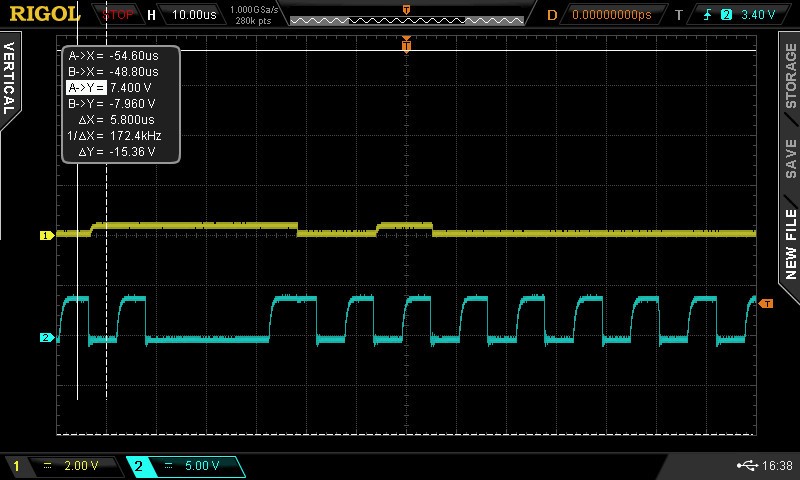Hi All,
Trying to write a byte to memory and then read it back to confirm the EEPROM communication is working.
Tried using the example code...
#include <msp430f6776.h>
unsigned char TXData;
unsigned char TXByteCtr;
void main(void)
{
WDTCTL = WDTPW | WDTHOLD; // Stop WDT
// Setup P2.5 UCB0SCL, P2.6 UCB0SDA
P2SEL0 |= BIT5 | BIT6; // Set P2.5,P2.6 to UCB0SCL, UCB0SDA
// Setup eUSCI_B0
UCB0CTLW0 |= UCSWRST; // Enable SW reset
UCB0CTLW0 |= UCMST | UCMODE_3 | UCSSEL_2; // I2C Master, use SMCLK
UCB0BRW_L = 12; // fSCL = SMCLK/12 = ~100kHz
UCB0BRW_H = 0;
UCB0I2CSA = 0xA0; // Slave Address is 0A0h
UCB0CTLW0 &= ~UCSWRST; // Clear SW reset, resume operation
UCB0IE |= UCTXIE0; // Enable TX interrupt
TXData = 0x0A; // Holds TX data
while (1)
{
TXByteCtr = 1; // Load TX byte counter
while (UCB0CTLW0 & UCTXSTP) ; // Ensure stop condition got sent
UCB0CTLW0 |= UCTR | UCTXSTT; // I2C TX, start condition
__bis_SR_register(LPM0_bits | GIE); // Enter LPM0 w/ interrupts
__no_operation(); // Remain in LPM0 until all data
// is TX'd
TXData++; // Increment data byte
}
}
//------------------------------------------------------------------------------
// The USCIAB0_ISR is structured such that it can be used to transmit any
// number of bytes by pre-loading TXByteCtr with the byte count.
//------------------------------------------------------------------------------
// USCI_B0 interrupt service routine
#if defined(__TI_COMPILER_VERSION__) || defined(__IAR_SYSTEMS_ICC__)
#pragma vector = USCI_B0_VECTOR
__interrupt void USCI_B0_ISR(void)
#elif defined(__GNUC__)
void __attribute__ ((interrupt(USCI_B0_VECTOR))) USCI_B0_ISR (void)
#else
#error Compiler not supported!
#endif
{
switch (__even_in_range(UCB0IV, 30))
{
case USCI_NONE: break; // No interrupts
case USCI_I2C_UCALIFG: break; // ALIFG
case USCI_I2C_UCNACKIFG: break; // NACKIFG
case USCI_I2C_UCSTTIFG: break; // STTIFG
case USCI_I2C_UCSTPIFG: break; // STPIFG
case USCI_I2C_UCRXIFG3: break; // RXIFG3
case USCI_I2C_UCTXIFG3: break; // TXIFG3
case USCI_I2C_UCRXIFG2: break; // RXIFG2
case USCI_I2C_UCTXIFG2: break; // TXIFG2
case USCI_I2C_UCRXIFG1: break; // RXIFG1
case USCI_I2C_UCTXIFG1: break; // TXIFG1
case USCI_I2C_UCRXIFG0: break; // RXIFG0
case USCI_I2C_UCTXIFG0: // TXIFG0
if (TXByteCtr) // Check TX byte counter
{
UCB0TXBUF = TXData; // Load TX buffer
TXByteCtr--; // Decrement TX byte counter
}
else
{
UCB0IFG &= ~UCTXIFG; // Clear USCI_B0 TX int flag
UCB0CTL1 |= UCTXSTP; // I2C stop condition
__bic_SR_register_on_exit(LPM0_bits); // Exit LPM0
}
break;
case USCI_I2C_UCBCNTIFG: break; // CNTIFG
case USCI_I2C_UCCLTOIFG: break; // LTOIFG
case USCI_I2C_UCBIT9IFG: break; // BIT9IFG
default: break;
}
}
The EEPROM is the 24LC02B with slave address 0xA0 I believe.
It just sits in the no_operation() routine and never interrupts.
Any help is appreciated.


